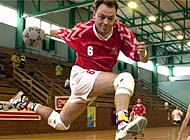Taiwan sweeps Tchoukball titles

Taiwan has won both the men's and the women's titles at the world Tchoukball championships in Geneva. The organisers said the event had been a good opportunity to bring this little-known sport to a wider audience.
Taiwan’s teams won convincing victories over Britain in Sunday’s final: the men took their game 60-42 and the women secured their gold medal with an equally solid win of 49-29.
Switzerland came third in both categories, a disappointment for the hosts and inventors of the sport.
Tchoukball was created in Geneva 30 years ago and prides itself on its sportsmanship. It is a cross between handball and basketball and requires a minimum of equipment to play. All that is needed is two small trampolines, known in the game as “the frames” or “rebound surfaces”.
A game of Tchoukball lasts 45 minutes, or three periods of 15 minutes. There are either seven or nine players per side, depending on the size of the pitch.
The team with the ball can attack either of the frames, which are tilted at an angle of 55 degrees and placed at either end of the playing surface. Teams are allowed to make three passes before they have to throw the ball on to one of the trampolines.
The attacking team has to throw the ball in such a way that the other team cannot catch the rebound. If the ball hits the ground, the attackers get a point. If the defenders catch it, they become the attackers and the match carries on.
Two very important rules set Tchoukball apart from other sports. First, the attacking team can attack either of the two frames, so they can immediately attack the same end of the pitch as they have just been defending.
Second, the defending side is not allowed to intercept the ball. This means that organising a defence is just as important as constructing an attack.
Tchoukball was the brainchild of the Geneva doctor, Hermann Brandt, who wanted to encourage a new attitude towards sport. As a doctor he found that many sporting injuries were the result of collisions between players, so he devised a game with rules to avoid contact.
The organisers of the five-day world championship said the event had fulfilled the goals of publicising the sport and encouraging young people to participate. They said many people had taken advantage of facilities provided at the city’s Jardin des Sports to try out Tchoukball, and that they were confident this would lead to an increase in the number of players in Switzerland.
by Malcolm Shearmur

In compliance with the JTI standards
More: SWI swissinfo.ch certified by the Journalism Trust Initiative
You can find an overview of ongoing debates with our journalists here. Please join us!
If you want to start a conversation about a topic raised in this article or want to report factual errors, email us at english@swissinfo.ch.